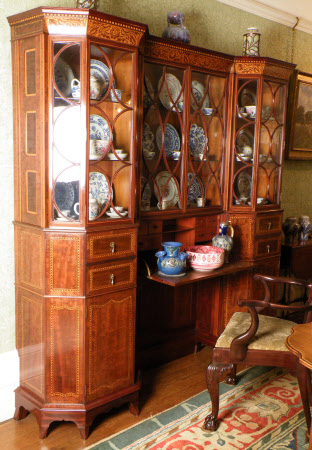Display cabinet
George Washington Jack (1855-1932)
Category
Furniture
Date
circa 1890
Materials
Mahogany, chequer inlay, marquetry, glass, brass handles
Measurements
101.5 x 170 x 49.5 cm
Order this imageCollection
Standen House and Garden, West Sussex
NT 1214005
Summary
A mahogany and chequer inlaid secretaire display cabinet, by Morris & Co., circa 1890. Designed by George Jack. Of inverted breakfront outline and with panelled sides, the upper section with a leaf marquetry frieze above a central pair of doors flanked by a further door to each side with canted angles, all glazed and with geometric astragal bars, the lower section with a central secretaire enclosing an arrangement of drawers and pigeon holes behind a fall-front writing surface, above and flanked by further drawers and cupboards, standing on swept bracket feet.
Full description
George Jack (1855-1931), architect and designer, designed furniture for Morris & Co. from 1885, after working in the offices of Philip Webb. Founded in 1861 as Morris, Marshall, Faulkner & Co., the firm was soon referred to as Morris & Co., although the name was not officially adopted until 1875 when William Morris (1834-1896) became sole proprietor. Responsibility for the design of almost all commissioned furniture passed to Philip Webb, whose influence was enormous, and (from 1880) his assistant George Jack, while Morris produced designs for glass, tapestries and any painted furniture. From 1871 wallpapers, designed by Morris, became an important part of the business. Show rooms in Oxford Street were acquired in 1877. Greater commercial success in the 1880s led to the opening of a shop in Manchester in 1883. Some of the well-known interior schemes undertaken by Morris include Rounton Grange in Yorkshire, Old Swan House in Chelsea, Great Tangley Manor in Surrey, Wightwick Manor, Stanmore Hall in Middlesex and Standen. In 1887 Morris & Co purchased the Holland & Sons cabinet-making workshops in Pimlico, thereby overnight acquiring one of the most skilled teams of craftsmen available. Morris & Co exhibited a similar cabinet at the Franco-British Exhibition in 1908 which was purchased by William Knox D'Arcy for Stanmore Hall, Middlesex and is illustrated in situ in J. Cooper, Victorian and Edwardian Furniture and Interiors, Thames & Hudson, 1987, p.178, Fig.474. Another similar, but smaller, secretaire display cabinet stamped Morris & Co, 449 Oxford St W. 1398 was sold at Christie's London, 30 October 2013.
Makers and roles
George Washington Jack (1855-1932), designer Morris & Co., manufacturer
References
Cooper, Jeremy 'Victorian and Edwardian Furniture and Interiors (1987), p.178, Fig.474

